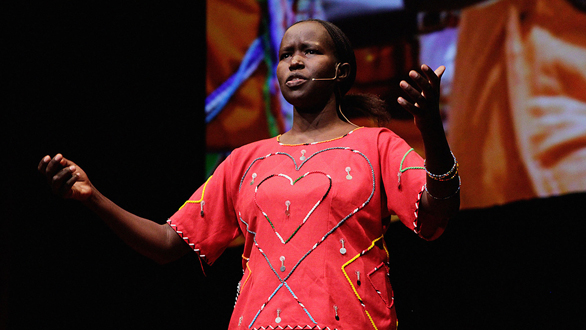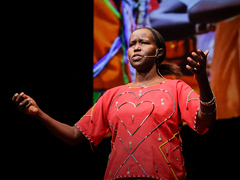 Kakenya Ntaiya was engaged at 5-years-old, her family members regularly whispering in her ear, “Your husband just passed by.” This was the traditional path that unfolded before girls in the Maasai village in Kenya where Ntaiya grew up.
Kakenya Ntaiya was engaged at 5-years-old, her family members regularly whispering in her ear, “Your husband just passed by.” This was the traditional path that unfolded before girls in the Maasai village in Kenya where Ntaiya grew up.
 Kakenya Ntaiya: A girl who demanded school
“In Maasai culture, the boys are brought up to be warriors, the girls are brought up to be mothers,” says Ntaiya in today’s incredible talk, given at TEDxMidAtlantic. “Everything I had to do from that moment was to prepare me to be the perfect woman by age 12.”
Kakenya Ntaiya: A girl who demanded school
“In Maasai culture, the boys are brought up to be warriors, the girls are brought up to be mothers,” says Ntaiya in today’s incredible talk, given at TEDxMidAtlantic. “Everything I had to do from that moment was to prepare me to be the perfect woman by age 12.”
But Ntaiya had a different dream — to be a teacher. And so she offered her father a trade: she would go through with the traditional ceremony that marked her rite of passage into womanhood — which included clitoral circumcision — if he allowed her to go back to school and continue her education.
“The day before the ceremony, we were dancing, having excitement — we did not sleep,” says Ntaiya, remembering the week-long lead-up. But she also recalls the painful circumcision itself and the long healing process. “Three weeks later, I was healed and was back in high school. I was more determined to be a teacher now so that I could make a difference.”
Eventually, Ntaiya she got a scholarship to study at Randolph Macon College in the United States and convinced her village elders to allow her to go.
“My father is not the only father I have. Everybody who is my dad’s age in the community is my father, by default, and they dictate what my future is,” she explains. “When the men heard that a woman had gotten an opportunity to go to school, they said, ‘This should have gone to a boy. We can’t do this.’”
Ntaiya has great reverence for her Maasai culture — she opens her talk saying, “You know what’s cool? I’m one of them.” To hear how she used her culture’s traditions to get the men of her village to support her education and how — upon returning to the village after graduate school — she was able to gain their support for founding a school for girls, listen to this powerful talk.
As she says, “I learned that ceremony I went through is called female genital mutilation. I learned that it was against the law in Kenya. I learned that I did not have to trade part of my body to get an education … As we speak right now, 125 girls will never be mutilated. 125 girls will not be married when they are 12-years-old. 125 girls are creating and achieving their dreams.”
Below, get to know more about Kakenya Ntaiya.
In addition to her work with The Kakenya Center for Excellence, Ntaiya is an emerging explorer with National Geographic. Here, a video she made explaining more about her motivation in founding her school for girls.
“When I started learning about the things I was in school, it really taught me that this should not be happening to young girls. These girls needed a place where they could be nurtured and a place where they could be told that marriage is not the end,” explains Ntaiya. “I have girls in my school right now — they have dreams of wanting to be pilots, they want to be doctors. They want to explore the world.”
Here, an essay Ntaiya wrote upon returning to Enoosaen, Kenya, to visit her family in 2008:
“I was so glad to be home after a two-year absence but my sense of relaxation was almost immediately replaced by a sense of desperation. The needs of the community are plainly overwhelming; lack of basic needs such as water, power, proper roads, proper education facilities, health care facilities—these are the first things you notice as you near my village. As I drove home on a dusty road, I could not help but wonder how strong my people are and how spoiled I have become living in America. Why did I even complain that there was dust on my nine-month-old son who was having fun watching the open road?” Read the full journal entry »
Here, Ntaiya’s journal entry, written after the groundbreaking event for The Kakenya Center for Excellence in 2008:
“I was very excited but also nervous. I was not sure if the community would turnout in big numbers for the event or if the only attendees would be from supporting women’s groups—Empiris group, the Kakenya Center for Excellence Committee and my friends from Vital Voices.
In preparation for the event, women from the village spent the whole night cooking: a bull was slaughtered and coupled with all of the other wonderful food that we have in Kenya. A film crew from America was busy shooting footage and other guests were beginning to arrive, traveling on rough roads for four hours to reach Enoosaen. I felt truly blessed to have such a group of supporters and friends. “Why worry about the ones who don’t want to come?” I consoled myself.
As you may have guessed, the turn out was unbelievable.” Read the full journal entry »
In 2010, here’s what Ntaiya wrote while raising money for a dormitory for the school:
“I remember my own first experience as a boarder at age fourteen when the doors of education were opened to me. For the first time, I had my own bed with a mattress, bed sheets and a blanket. I even owned my very own towel! As is the case with our girls, I had always shared a bed with my sisters and we used a cow skin as a mattress. We shared the blanket and we never had bed sheets. So, I was completely thrilled to have my own little bed and sheets and towels. You can imagine that our girls will be just that happy to have their own belongings too!” Read the full journal entry »
And here is what she wrote after receiving a grant to help finish the dormitory in 2010:
“When I received the call from Aaron that ‘Kakenya’ had won an award, I could not believe it. I was stunned speechless. When he went on to tell me that the award came with $25,000 that Vital Voices was going to donate to the school, I was overjoyed. The money would make a huge impact on our girls.
We had started building the dormitory, but we were $40,000 short, and Phase 1 must be completed by the first week in January. If construction was not finished, I worried that we would need to choose between not admitting the next group of girls and admitting them without housing. Just as bad would be having to send the 63 girls we currently house in an unused classroom—the one we need for the new students in January—back to their homes at the end of every day. We would no longer be a boarding school in a safe, sheltering environment. Most girls would need to walk long distances—up to 5 miles each way—and would be subjected to the dangers of animal and human predators, And for the 63 girls, the necessity of moving off campus would demoralize them. Although they have been sleeping two to a bed, they have been happy, self-confident girls with a growing sense of academic excellence and a higher self-esteem. Walking would necessitate lengthy chores at home and greatly diminished time for homework, along with the complete loss of extra-curricular activities on which our school prides itself.
The award has renewed hope.” Read this full journal entry »
Comments (5)
Pingback: Blogs We Are Reading - Meet Kakenya Ntaiya & Social Justice: Not Just Another Term for “Diversity” - UCDS
Pingback: Beyond Beyond ™ - UK & International Wedding Blog | Free iPad Wedding Magazine | Real Wedding Photography | DIY Ideas
Pingback: Wizmo Blog » Blog Archive » Meet Kakenya Ntaiya, who worked with her elders to found a school for girls in her Maasai village